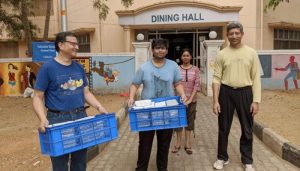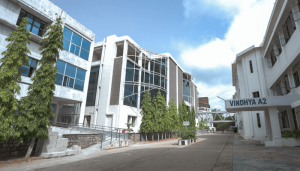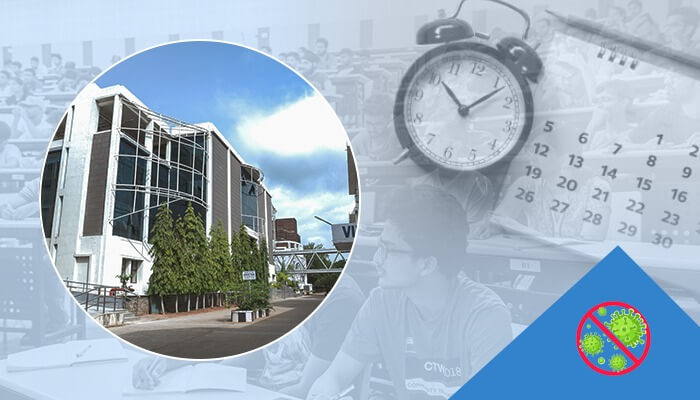Here’s a look at the events that unfolded on campus in the run-up to the nation-wide lockdown imposed to contain the alarming coronavirus outbreak. Do read on to find out how the International Institute of Information Technology Hyderabad is undertaking unprecedented measures to handle the situation.
When an official announcement about an indefinite postponement of the much-awaited R&D showcase event was made in the first week of March, it raised a few eyebrows. For those who’ve come in late, the R&D Showcase is an annual event on campus bringing together high-profile industry professionals, heads of various R&D departments, engineering college students and just about anybody interested in learning about IIITH’s latest research and technological advancements. It was scheduled for the weekend of March 7 and 8, respectively. Even though India had reported its first COVID-19 case way back on January 30, 2020, terminology associated with the coronavirus such as social isolation and distancing hadn’t yet made it to the average Indian’s lexicon. So on March 4 2020, when an internal committee took the decision to postpone the R&D event indefinitely, the move seemed a bit over-cautious in the context of the emerging viral outbreak then. Incidentally it wasn’t until March 11 that the WHO declared the outbreak as a pandemic. What most didn’t know is that the management and other members had been closely following the developments of the COVID-19 outbreak world-wide and proactively decided to cancel the publicized event that was slated to draw in huge crowds. At the national level too, while March 3 reported 3 positive cases, a day later (March 4) saw a sudden leap in numbers with 28 cases on record. With this, an almost simultaneous decision was taken to call off Holi celebrations on campus too, scheduled for March 10. “There was a mixed response to this announcement from the students, but overall they understood the situation and did not participate in the ‘Festival of Colours’,” says Ankit Pant, General Secretary of the Students’ Parliament. Alongside these measures, a decision was taken to relax attendance requirements so as not to force those who were either feeling unwell or just uncomfortable about being in the proximity of a large number of peers in classes.

Suspension of Coursework
When a pandemic is declared, the intent is to propel Governments to put in place emergency preparedness strategies with adequate curbs on travel and trade. On campus, it saw the creation of an Apex body to anticipate and handle any upcoming fallouts arising from the situation. It consisted of Prof. Prabhakar Bhimalapuram, Prof. Krishna Reddy and Ramana, Deputy Registrar. By March 14, the nation had crossed the double digit mark in positive cases of COVID-19 with Telangana reporting 16 of them. That evening, the state government issued a notification mandating closure of all educational institutions – from primary schools, to universities, movie theatres, gyms, clubs and the like, for an initial period of two weeks. The institute in turn declared a suspension of all coursework and made it mandatory for all undergraduate and post graduate students (doing non-research work) to return home within 4 days. Exceptions were however made for those who had genuine reasons for not undertaking travel. For research students, an option of either returning home or staying on to complete their work was given. “Faculty did not force their views on the students. We neither stopped them from leaving nor did we encourage them to stay on,” says Prof. Bhimalapuram. As a result, around 250 of 500 registered research students left for their homes.

False Alarm
The following week saw a scare on campus that necessitated a self-imposed lockdown. A research student reported to Arogya, the on-campus clinic with indications of fever and breathlessness. When he was taken to the local corporate hospital, the pulmonologist on duty ordered a COVID-19 test to be undertaken. Suspecting the contagious viral infection, the apex body called for a complete clamp-down of the institute where none of the campus residents was allowed to leave. With a negative test result coming in 2 days later, the institute-level lockdown was lifted. The relief was palpable with most remaining students also choosing to immediately evacuate the premises. Only around 70 of them who either could not or did not want to leave for various reasons stayed back. “Some of the Dual Degree program students have requirements of papers to be submitted. The others are trying to figure out long-term plans for their research work,” explains Prof. Bhimalapuram. With the Prime Minister first announcing a one day total bandh or Janata Curfew on March 22, and two days later imposing a nation-wide lockdown for a period of 3 weeks, the apex body swung into action.

Emergency Preparedness
“We (apex body) had to have a degree of preparedness at three levels. The most important being securing the campus with limited security personnel. The second was in terms of ensuring essential functioning of the institute which included adequate food supplies for the faculty, staff and 70-odd students who were on campus. And the third was to complete all teaching requirements before the end of the on-going semester,” says Prof. Bhimalapuram. With an additional curfew slapped on by the state government from 7 pm to 6 am, allowing only the movement of essential goods and services of those associated with them, services provided by Security, Housekeeping, Plumbing, Electrical, and Mess staff were directly impacted. In the case of Security, 9 guards volunteered to stay back on campus, away from their families for an uncertain period of time. This skeletal staff has been scattered across some strategies posts such as the Main Gate, Vindhya A4, KCIS Admin entrance, and the hostels. Housekeeping duties are shared across families in the staff and faculty quarters. In the case of hostels too, students have stepped in to do their share of cleaning and attending to the general upkeep of the institute. With a substantial reduction in the number of students on campus, three messes have been shut down and all the associated stocks consolidated in one place, the Kadamba mess. Fortuitously, a few mess staffers reside on campus permanently thus ensuring an uninterrupted supply of simple meals, albeit on a minimalistic scale. An important service that was in peril was the management of water supply and power control to the campus, since it warranted the presence of operators who unfortunately reside in the city. A staff member stepped forward and a knowledge transfer session was held to explain the workings of various controls for pumps, sumps, and overhead tanks. For sorting out electrical issues arising during this time, the Junior Electrical Engineer fortunately resides on campus.

Living With Lockdown
Complying with the national mandate, the institute’s strict lockdown policy supports social isolation. Stating that Swiggy deliveries were limited to the main gate even as early as the first week of March, Prof. Bhimalapuram says that currently, individual deliveries of any kind, even essentials are banned. A Google doc form is circulated once in a few days for faculty and staff where they can list out their requirements of groceries or vegetables and fruits. “We have only one vendor each for milk, groceries and vegetables and fruits. The groceries are supplied in bulk, for instance, in bags of 10 or 25 kgs. So we split it amongst our neighbours and friends. There is no door delivery and it happens at the entrance of the building where only one or two persons are allowed to pick it up,” says Prof. Radhika Mamidi, who resides on campus. With limited vendors coming in, the hope is to have as minimal contact as possible with the world outside campus. A resident can leave the campus only for medical purposes. Resident volunteers have even pitched in to assist an NGO, T-Sig in partnership with the Govt. of Telangana, in providing packed meal boxes twice a day to the thousands of stranded migrant workers in the city.

Online Curriculum
In August 2019, concerted efforts went in to ensure that most resources on campus were working with MS Products. Hence when a committee, formed to study and make appropriate recommendations on tools for online instruction, suggested the use of Microsoft Teams, there was already an institute-wide license available for Microsoft products. Rough guidelines have been shared with faculty on how to conduct classes online, such as taking a break every 10 minutes, making sure everyone is on the same page, and so on. “Apart from trying to ensure that the required content or information is being delivered to the students, with the help of Teaching Assistants (Tas), we are trying to conduct online tutorials, and get doubts addressed. Having said that, it’s still not a perfect substitute for in-class room learning and in-campus learning,” says Prof. Bhimalapuram. Prof. Jayanthi Sivaswamy exclaims that it is as busy as ever or even more running academics during the lockdown. “Online classes began on March 23. Much effort has gone and is going into running 87 courses online. Academic staff and the Tech team have ensured this happens as smoothly as possible despite the challenges thrown up by the fact that a large number of faculty also live off campus and have to do teaching from home”, says Prof. Jayanthi Sivaswamy, Dean of Academic Affairs. The Director, Prof. P.J. Narayanan adds, “It is satisfying to know that over 90% of the classes were conducted in Week 1, some as large as 250+ students! Even more interestingly, the average attendance in these classes was 82%. We expect to conclude the Spring 2020 semester in the online mode only,” he says.

Extraordinary Circumstances
There have been a couple of instances where students residing in remote areas are plagued with terrible internet connectivity. Or even cases where students have been stranded someplace with no access to their laptops. The institute is working out revised assessment and grading schemes which are fair and flexible in view of such extraordinary conditions under which learning is taking place currently. Faculty has also been advised to treat such special circumstances with compassion. Additionally, students themselves have the option of withdrawing the course from evaluation.
With students scattered all across the country, a vacant campus made all the more empty with the public health policy of ‘social distancing’, these are not the best of times for those already suffering from mental health issues. The institute has a mental health team comprising of two counselors and a psychiatrist to address any or all mental health issues of students. With the lockdown in place, the team has moved their services to the virtual medium. There is an FB page titled IIIT Mental Health Forum where anyone can post anonymously and interact with the professionals regarding anything related to mental health. There are three channels currently open, via FB, email and Skype calls. “It’s not just students. With daily routines getting disrupted and social lives coming to a sudden standstill, it’s difficult for many to adjust to this big change. Psychological studies conducted have predicted that the COVID-19 pandemic is going to have a huge impact on mental health and bring about a depression epidemic of sorts. Apart from those already at risk of developing mental illnesses, the most vulnerable would be those affected financially. But even otherwise healthy individuals will get a diffused sense of psychological distress. For students, it is the suddenness with which they were asked to leave, the uncertainty of how the semester will come to an end, future plans for those who are due to graduate, and so on,” says Prof. Priyanka Srivatsava, Campus Counselling Coordinator.
Social Impact
CIE-IIITH in partnership with Pernod Ricard India Foundation has launched a Social Impact Incubation cum Acceleration program focussing on the COVID-19 Solutions lead by Women founders and innovators. The program aims to tide over the situation with hacks and innovative solutions in the areas of home care, elderly care, hardware devices and preventive healthcare. Through this accelerator program, an attempt is being made to provide a platform for Women Entrepreneurs and Women-led Enterprises with access to mentorship, deployment, technology support and upto ₹25 Lakhs Grant to fight back against COVID-19. The program is also supported by the Centre for Healthcare Entrepreneurship at IIT Hyderabad, Atal Incubation Centre- Centre for Cellular and Molecular Biology (CCMB), RICH, TIE Hyderabad.
To register please visit: https://cie.iiit.ac.in/pernod-ricard/

Community Cares
The unfortunate situation has provided the rest of us a glimpse into how the campus community has come together as a single, cohesive unit. “We’ve always believed that we were not top-driven and we can see it demonstrated in this particular scenario,” says Prof. Bhimalapuram. While appreciating the untiring efforts of the institute’s faculty, staff, and others in helping tide over these difficulties, the Director, Prof. P.J. Narayanan makes a special mention of the students. “Our students are most understanding and cooperative, which makes it totally rewarding to go the extra mile on everything!”




Very very nice and informative article. I could able to know most of the happenings in the campus while staying at home for working…
Prabhakar Mootakoori says: